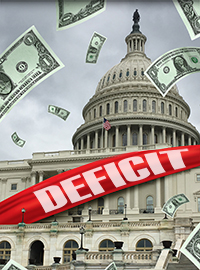| What to Make of New Projections of Big Government Savings |
 |
|
By Veronique de Rugy
Thursday, June 08 2023 |
We have a debt-ceiling deal. It's a relief for most people. This deal avoids a default and the need for the Department of the Treasury to make hard choices over which bills to pay. It gives Republicans the sense that a step was taken toward fiscal responsibility and gives Democrats the sense that they've made an unprecedented sacrifice. Many hope their spending restraint days are over. But a deeper look into headline-grabbing projections of huge savings reveals that nothing could be further from the truth. Much more needs to be done, and it needs to be done pronto. Indeed, while we may celebrate the end of another round of debt-ceiling drama, it won't make much of a difference in the long-term trajectory of the U.S. debt. According to the Committee for a Responsible Federal Budget, the plan as drafted will bloat the debt to 115% of GDP by 2033, as opposed to 119% before the deal, and reduce the deficit by at least $1 trillion and at most by $2 trillion over 10 years. While it's not nothing, it's a drop in the current deficit bucket, which the Congressional Budget Office (CBO) projects to be over $20 trillion over the next 10 years, or 7.3% of GDP in 2033. That's almost twice what was projected 10 years down the road at the end of the last financial crisis. All the above assumes that the CBO's own assumptions – some of which are nowhere near certain – are correct. Even ignoring the likelihood that politicians will use every gimmick in the deal to spend more, 10-year projections are always unreliable. As such, I expect much more spending and borrowing than is currently projected. For one thing, the CBO's projections are based on current law and existing policies. Future policy changes, such as tax reform or changes to entitlement programs, are almost certainly not fully accounted for. If such changes result in more revenue or less spending, the actual outcomes would be better than projected, and vice versa. In this case, the CBO assumes that some of the provisions in the 2017 Trump tax cuts will expire on schedule, which would reduce deficits. That's unlikely to happen. Republicans' identity is tied to tax cuts while President Joe Biden has pledged not to raise taxes on those making below $400,000. That points to an extension of the tax cut provisions, which would add an estimated $2.5 trillion to the deficit over 10 years ($2.8 trillion counting additional interest payments). Plus, even if taxes did rise, economic growth would slow, reducing revenues and increasing deficits. Projections obviously don't account for unforeseen events like natural disasters, economic shocks or geopolitical upheavals. Yet such events will occur and significantly impact the economy and government finances – and they always lead to deficits larger than projected. With the war in Ukraine still going on and the threat of conflict in the Taiwan Strait, it isn't hard to see additional unplanned defense spending in our future. The CBO projects future health care spending based on current trends. However, these costs might increase at a faster rate than anticipated. An aging population and changes in workforce participation can have significant fiscal implications. If the CBO's assumptions about any of these factors are inaccurate, it will reduce the precision of their long-term projections. But the biggest potentially unaccounted for changes are from two things that readers are painfully familiar with: persistent inflation and rising interest rates. Right now, the CBO projects that the 3-month treasury bill rate will average around 2.5% over 10 years – 2 percentage points below today's level. In a recent talk at the Peterson Institute, former Treasury Secretary Larry Summers noted that with so much debt and borrowing, and with inflation above 2% likely to persist, a rate of 4% would be a better estimate. Adding just 1% to the interest level would add about 1.3% of GDP in interest payments to the deficit 10 years from now. Finally, the CBO assumes that inflation will indeed return to its 2% target. This is currently unlikely. What's more, if short-term investors get spooked by growing government spending and the lack of plans to pay it back, they might also assume more inflation in the near future. That can jack up inflation today, impacting interest rates and the deficit. Unless we get an unexpected surprise in the other direction – something like a miracle economic and productivity boost from the AI revolution – expect deficits to be larger than projected. This means Congress needs to get right back to work. Veronique de Rugy is the George Gibbs Chair in Political Economy and a senior research fellow at the Mercatus Center at George Mason University. COPYRIGHT 2023 CREATORS.COM |
Related Articles : |
























